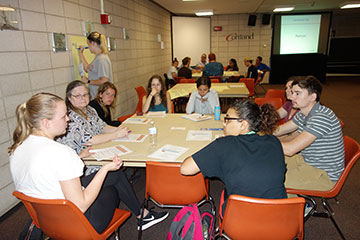
04/02/2024
Is free speech compatible with inclusion?
It’s a question that SUNY Cortland’s Institute for Civic Engagement welcomes everyone to discuss when the two ideals are the focus of “Free Speech and the Inclusive Campus,” a deliberative dialogue on Wednesday, April 3, at SUNY Cortland.
The event, from 5 to 7 p.m. in Park Center’s Hall of Fame Room, is participatory. John Suarez, director of the Institute for Civic Engagement, said all who attend should be ready to discuss options for blending the values of inclusivity and free speech, and to decide on actions to carry out that goal.
To register, participants can email Suarez at john.suarez@cortland.edu so that there are enough materials at the event.
The aim is to embrace disagreements in a positive manner.
“Put them on the table, but do so in a constructive, mutually respectful way,” Suarez said. “One of the phrases that we use is ‘constructive disagreement,’ listening to people and understanding where they’re coming from so that we more effectively identify areas of agreement as we work to design ways of addressing issues.”
Students in two SGA clubs also helped organize the event — BridgeCortland, a campus chapter of the national group Bridge USA, which helps organize civil talks on controversial topics; and Turning Point USA/Cortland, a chapter of Turning Point USA, whose stated goal is to encourage the discussion of libertarian ideas.
This deliberative dialogue will have three parts:
- 5 to 5:30 p.m.: An introduction in which student moderators explain the event and describe the issue.
- 5:30 to 6:30 p.m.: Participants engage in small group discussions to consider three options for blending inclusivity and free speech.
- 6:30 to 7 p.m.: Participants reconvene as a large group to share the results of their discussions and to identify at least one step that can be taken to reach that goal.
Finding a balance between the rights of individuals with the responsibilities of institutions can be divisive, Suarez said. But the right methods can ease some of the tension between different ideologies.
“Listening to other peoples’ descriptions of why a particular issue is so important to them will start bringing out emotional connections,” Suarez said. “If we use logic to convince somebody of a different point of view when that person’s opinions include a heavy dose of emotion, we’re being illogical because we must remember that the emotional component is important. Using logic can be illogical.”
The upcoming dialogue is the first of several programs on campus that are a part of Dragons for Democracy, which Suarez describes as a term for the work the Institute does to get people engaged on and off campus, especially in collaborating with government.
“Government is an important partner because through government we have funding resources, we have policy changes, we have laws that can be instituted,” he said.
Also scheduled is the first official event of Heterodox Cortland Community. The group is Cortland’s local offshoot of international organization Heterodox Academy. Their declared objective is the support of open inquiry, using the tagline “Not all great minds think alike.” Suarez co-chairs the group with Associate Professor Jill Murphy, chair of the Health Department.
The group’s first official event is April 4 from 6 to 7:30 p.m. in Sperry Center, Room 105. A documentary, “The Coddling of the American Mind,” will be screened, followed by a Q&A session with Anthony Rodriguez, who appears in the documentary.
On Thursday, May 30, faculty, staff and any students still in the area are invited to a full-day workshop called” Civic Learning Through the Lens of Racial Equity.” It will feature John Reiff, director of Civic Learning and Engagement in the Massachusetts Department of Higher Education, and Equity and Engagement Fellow at Campus Compact.
“This (workshop) is another example under that umbrella of democracy engagement of how we work with government,” Suarez said. “Dr. Reiff will be helping us understand how to reach out not only to our not-for-profit partners, but also to the broader community, including government leaders.”
For more information on upcoming Institute for Civic Engagement events on campus, Suarez can be contacted by email or by phone at 607-753-4391.